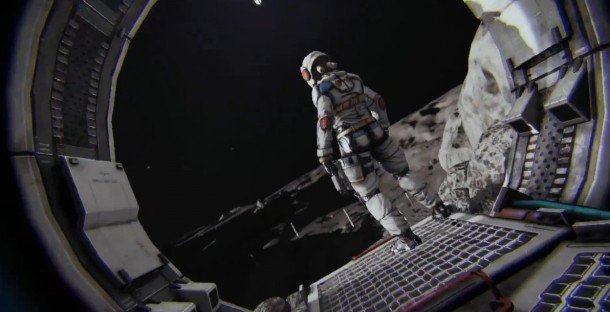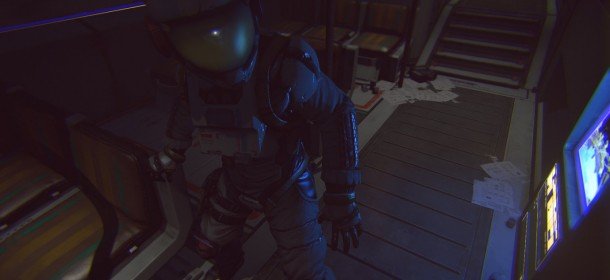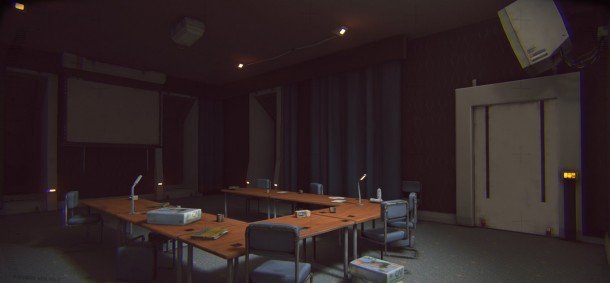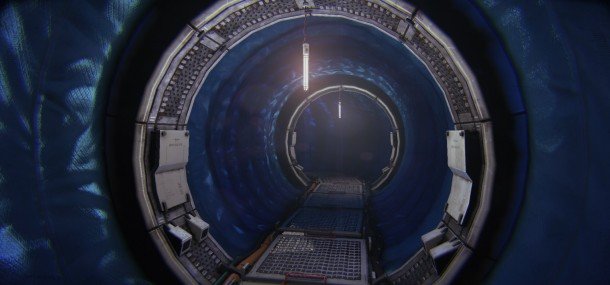Routine: indie survival horror from the dark side of the Moon

The Moon is a perfect setting for an exploration horror game. It's remote, dark and hostile, but not entirely alien. We've seen it close up in ghostly archive footage of the Lunar landings. Nobody's built a proper Moon Base yet, but we're familiar with the utilitarian angles of Nasa architecture. Alien, Space: 1999 and 2001: A Space Odyssey have shown us the claustrophobic corridors and cluttered mess halls of the future.The Lunar base we'll explore in Routine occupies fertile middle ground between the familiar and the unknowable - a perfect place to deliver some scares.
Greenlight voters seemed to agree. Routine was one of the first games to get the go-ahead from Valve after the release of the arresting Gamescom trailer. I called up art and design man Aaron Foster find out more about Lunar's intriguing take on survival horror.
Routine is a first person horror game set on an abandoned (OR IS IT?) moon base. It's as much about exploration as sudden scares. Lunar Software want to move away from the scripted frights of linear big-budget horror games like Dead Space and give players the opportunity to wander the base at their own discretion. An unknown AI-driven enemy will stalk the corridors, reacting to your movements to produce unpredictable encounters.
"Most horror games are extremely linear in their design because they need to set up these scenes for the player to get scared. There are a few exceptions, but the ones that are are very simple and streamlined, " Said Aaron. He reckons that the anticipation that comes before the scare is as powerful as the moment of confrontation itself. "The scary thing about a horror movie or game is that not knowing, not knowing what's going to happen, or who it is, or what it is and I really want to try and make sure that we don't spoil too much."

For that reason, he sidesteps questions about exactly what we'll be running away from in Routine. The trailer shows a humanoid robot marching through the base, but Aaron hints that there's more to the tale than a race of out-of-control droids. Every confrontation with the beast/demon/ghost/dragon/space zombie will matter. Permadeath is an important part of Routine. If you're killed, you'll have to start anew.
That means we'll spend a lot of time raiding the moon base in terrified silence, so it's essential that the facility be interesting and deeply atmospheric. For the sake of immersion, there will be no HUD or health bar, and you won't have many items to help you out. Aaron says there will be a risk reward element to every action. You have a tool that will make it easier to navigate the base's complex layout, but you'll lose access to your screen temporarily if you're forced to use your weapon.
Foster's greatest passion is in environmental art, an aspect of design that directly informs the mental state of the player in a horror game. You might be familiar with the uncanny valley. It's a disturbing humanoid robotics phenomenon that describes the point at which the subtly warped features and movements of an android face incur more fear than empathy in human observers. There's an uncanny valley to human living, too. In life, it can be seen in photos of the abandoned offices and schoolyards of Pripyat. In fiction, the spotless suburbia of the Stepford Wives has a similar effect.
The biggest gaming news, reviews and hardware deals
Keep up to date with the most important stories and the best deals, as picked by the PC Gamer team.
Pripyat is rife with the filth and decrepitude of abandonment, The Stepford Wives keep their slice of civilization in a state of inhuman, shrink-wrapped perfection. It's an opposition that runs throughout science fiction. It's the grimy, cynical dystopia vs the glowing, wantless utopia. It's Blade Runner vs. Star Trek. Aaron describes sci-fi films as "the most inspirational and influential things I had when growing up." His family lived near a video store when he was younger. He describes how their friendship with the owner gave him access to a great range of sci-fi features and horror films well before his 18th birthday.

"I was watching Alien, Aliens, The Thing, everything I could get my hands on," he said, "but I rewatched Alien and Aliens. Those movies left such an impression that when I got a little bit older and a little bit more able to find things myself I went off and found all the other late 70s, early 80s sci-fi movies like Silent Running. Even Space 1999, it has a crap plot, but really interesting aesthetics. The design of the base was still really cool."
Routine's moon base will occupy a middle ground between the scummy warrens of an urban cyberpunk neo-pit and the shining idealism of the Federation. The moon base is a pragmatic construction. It's a mix of cold boardrooms, futuristic hallways and ominous engine rooms. Imagine the gleaming white bulkheads of the U.S.S. Enterprise browned by age and sweat, scarred by overpopulation and thrown into disrepair by an unknown catastrophe.
"They've taken this really high-tech sci-fi design and then crammed a hundred people in a small, condensed area to live there for like, 20, 30 years. It's dirty and horrible," Aaron explained. "That's the way I try to see things. There's dirt stains everywhere, people lived in the corners of the floor, they've left lots of rubbish."
"I like the old chunky, slightly dirty white design of all the interiors. Everything always had a haze, a musk, everything was always a bit lived in. I always felt that was so much more relatable."

Routine is being developed by a team of four. Three are based in the front room of a Preston apartment and there's also a sound chap based in Australia. Greenlight success came as a big surprise. They were inspired to enter Routine into the voting process after watching Indie Game: The Movie, and slipped in just before Valve introduced the £100 entry fee. Would Lunar Software have taken the plunge if they'd had to pay?
"It wouldn't have been a barrier," said Aaron. "I would've paid that if it was a few grand. To me, you're making a game to not only get something out there that you are proud of, but you also, for all of us, we want enough return on that just to make the next game, right?
"We're not aiming to get mass millions because we'd have to make something different from what we're going, but we just want enough to be able to develop the next game, and I think Steam gives you the best opportunity of that. To us it was just a massive relief. Paying a hundred dollars, two hundred dollars, it doesn't matter at the end of the day."
Routine is due out next year. Soak up some of the atmosphere right now with the debut trailer.
Part of the UK team, Tom was with PC Gamer at the very beginning of the website's launch—first as a news writer, and then as online editor until his departure in 2020. His specialties are strategy games, action RPGs, hack ‘n slash games, digital card games… basically anything that he can fit on a hard drive. His final boss form is Deckard Cain.


